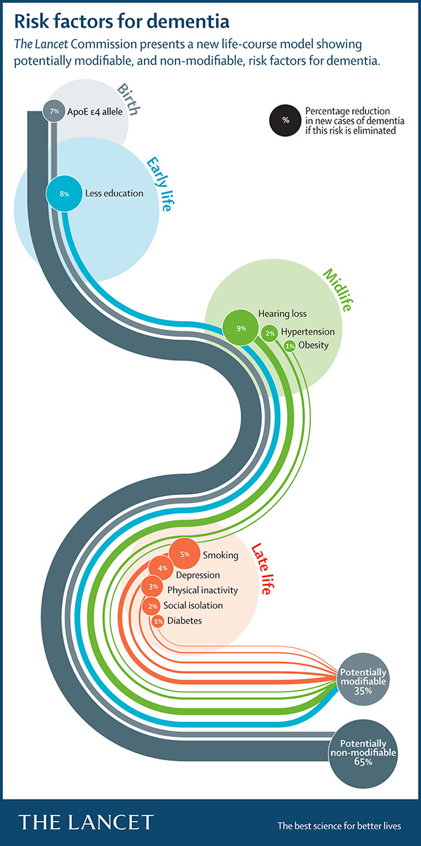The Lancet International Commission on Dementia Prevention, Intervention and Care
The Lancet Commission brings together 24 international experts to consolidate the huge strides that have been made in our knowledge and understanding of dementia risk factors, treatment and care, and the emerging knowledge as to what we should do to prevent and manage dementia. The Commission conducted a new review and meta-analysis; based on which they extended current models of risk by including hearing loss and social isolation. Incorporating potentially modifiable risk factors from across the life-span, they proposed a novel life-course model of risk, highlighting the opportunity for prevention.

Among their key recommendations are:
- Be ambitious about prevention. Interventions for established risk factors may have the potential to delay or prevent one third of dementias.
- Treat cognitive symptoms. To maximize cognition, people with Alzheimer’s dementia or dementia with Lewy bodies should be offered cholinesterase inhibitors at all stages, or memantine for severe dementia.
- Individualize dementia care. Good dementia care spans medical, social and supportive care; and should be tailored to unique individual and cultural needs, preferences, and priorities.
- Care for family carers. Family carers are at high risk of depression. Effective interventions reduce the risk and treat the symptoms, and should be made available.
- Plan for the future. People with dementia and their families value discussions about the future and important upcoming decisions.
- Manage neuropsychiatric symptoms. Management of the neuropsychiatric symptoms of dementia – including agitation, low mood or psychosis – is usually psychological, social, and environmental, with drug treatment reserved for more severe symptoms.
- Consider end of life. A third of older people die with dementia, so it is essential that professionals working in end-of-life care consider whether a patient has dementia as they may be unable to make decisions about their care or express their needs and wishes.
The nine modifiable risk factors include:
- Early life – Education to a maximum of age 15
- Mid-life – Hypertension; Obesity; Hearing loss
- Later life – Depression; Diabetes; Physical inactivity; Smoking; Low social contact
For the full study please visit PRNewswire where the Alzheimer’s Association posted this article
For more articles like this please sign up for our eTips by liking us on Facebook and giving us your email for our Newsletter.





